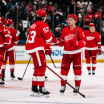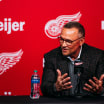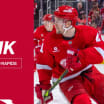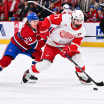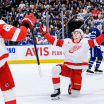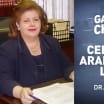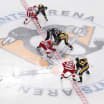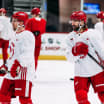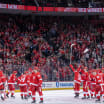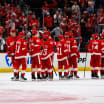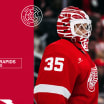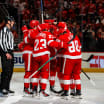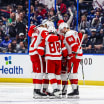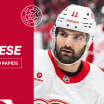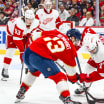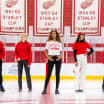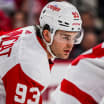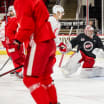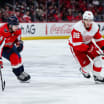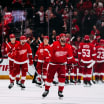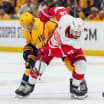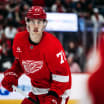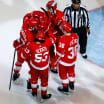DETROIT -- If other teams are not careful on their power play, the Red Wings could be headed toward their net for a shorthanded chance.
After Trevor Daley scored the game-winning goal against the Toronto Maple Leafs while shorthanded Friday night, the Wings tied the San Jose Sharks and Florida Panthers for the league lead with six shorties.
Notes: Red Wings' aggressive penalty kill paying dividends
Defenseman Jonathan Ericsson having solid, healthy season
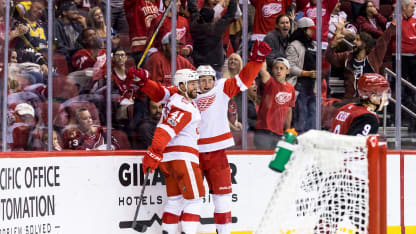
© Dan Mannes/Detroit Red Wings
By
Dana Wakiji @Dwakiji / DetroitRedWings.com
Tomas Tatar said after the game that it sometimes looked like the Wings had more offensive chances shorthanded than they did 5-on-5.
"You see a lot of 2-on-1s," said Dylan Larkin, who was with Daley on the 2-on-1 when Daley scored. "We have six but we could have more at this point. It seems like the past couple games, every time we're out there, we're creating something, which sounds crazy but as a power-play guy, when you know the other team's looking for offense, it puts you on your heels.
"Usually, there's four forwards out there (on PP) and one guy is going to bite and make a mistake because he's not used to be being back there and having to skate backwards. Last night and even the night before (Wednesday), we had two big goals shorthanded. It's nice we're helping to contribute."
Larkin has two of the shorthanded goals while Daley, Frans Nielsen, Luke Glendening and Darren Helm have one apiece.
"One thing that (assistant coach) Doug Houda's made a point of focus from the beginning of the year is when we have opportunities, let's be a threat on the penalty kill," Wings coach Jeff Blashill said. "When you insert Larkin in the kill, Nielsen and Helm, we got Double-A (Andreas Athanasiou) on one of the units, you have opportunities to have real threats there. Glennie, for that matter.
"The way everybody's power play is going, they're all about being four at the net. And when you have four at the net, if the puck goes the wrong way, you have opportunities for shorthanded chances. We've given up some shorthanded chances but I do think when you're a threat on the penalty kill, it backs teams off a little bit on the power play and it's a hard way to run a power play."
Nielsen said although they are trying to get the puck out of the zone, that doesn't mean they have to just clear it every time.
"I think just having some poise with the puck, even one guy less on the ice," Nielsen said. "At times when you get the puck you got more time than you think. You don't always have to just clear it down. I think we do a good job talking to the guy with the puck and letting him know if he has time, he can make a play. We got to try and beat guys up the ice."
The benefit is two-fold. Not only are the Wings creating offense while shorthanded, they're taking aggressiveness away from the other team's power play.
"Maybe they're not as aggressive as they would be, because they know if they're too aggressive, they can pay for it," Glendening said. "We just gotta stick to the things that we do well. When we play our system and we're blocking shots and getting pucks out, we get the opportunities we've had. And when we've cheated, we've gotten scored on. Just doing the simple things we do well, we're getting our chances."
It is a tremendous lift for the team when the penalty killers score.
"It's huge," Blashill said. "I think a shorthanded goal is a huge momentum changer. Lots of times you're looking at it and saying, boy, we're going to be down another goal and all of a sudden you score and it's a different story. Again, I just think it takes a lot away from the other team's power play. When they come in to their PP meeting, I guarantee their coaches are saying, they've scored this number of shorties. All of a sudden that puts you on your heels a little bit. It's a hard way to run a power play."
LARKIN ON BOTH SPECIAL TEAMS: Larkin can use his speed to benefit both the power play and penalty kill.
Captain Henrik Zetterberg has said he misses playing on both units because it not only gets you into the flow of the game, it also helps you.
"It's helped a lot, obviously, playing a lot, getting the extra minutes on the penalty kill," Larkin said. "Sometimes it's big minutes. It definitely has helped me with positioning and making reads. When you get tired on the penalty kill, you just got to suck it up and man up and stay tight and just get the puck out. That's really helped me.
"When I get tired 5-on-5, I kind of do the same thing, take a deep breath, take a look around where the guys are and then just try to get the puck out and not do anything too fancy."
ERICSSON FEELING GOOD: Quietly, Jonathan Ericsson is having a solid season.
On a team with few plus players, Ericsson is plus-1 to go along with one goal and six assists.
That is despite pairing with Daley to play against other teams' top players.
"I thought he was probably night in, night out our best D last year until he got hurt," Blashill said. "When he got hurt, I thought it really showed how much we missed him. It's hard to be his size and have the ability to be able to skate and do those type of things. Not many guys in the league (can), it's a unique skill set. He has the ability to go against the other team's best players and certainly him and Daley have been a good pair together.
"When he makes a mistake, it usually really shows because he's so big. But boy, we're in a tough spot without him."
Ericsson has dealt with chronic hip issues for several years but said he is feeling much better this year.
"I can skate better and the hips feel better on the ice so far," Ericsson said. "I'm getting even more help now from the training staff. We've got chiropractors at every game. I need that extra adjustment every time.
"It's a huge difference for me, especially if we've been on the road. If we're going a few games on the road, and I don't get any adjustments, that's gonna feel a lot different. On the long road trip he's coming to meet us for a couple of days.
"For me that's a big key, but also I get to know my body even more and what I have to do even more to keep it better, and what I shouldn't do to not aggravate it from the time when I don't skate. Obviously the skating feels a little bit better."
Ericsson said he has also benefited from the hydrotherapy and other amenities at Little Caesars Arena.
"We're getting all the tools we need and that we want to use," Ericsson said. "We've got a perfect set-up here. There's nothing to complain about. Obviously there's going to be people who have issues, but we've basically got the best chance to get back on the right track and all that."
Ericsson said he has also enjoyed playing with the smooth-skating Daley.
"He's obviously a more offensive guy than I am," Ericsson said. "I think we've kind of found a way where we know where we have each other out there. Just knowing kind of where we have each other, talking, communicating. That can always be better but it's a good start. We like the challenge of getting the match-ups a lot."

